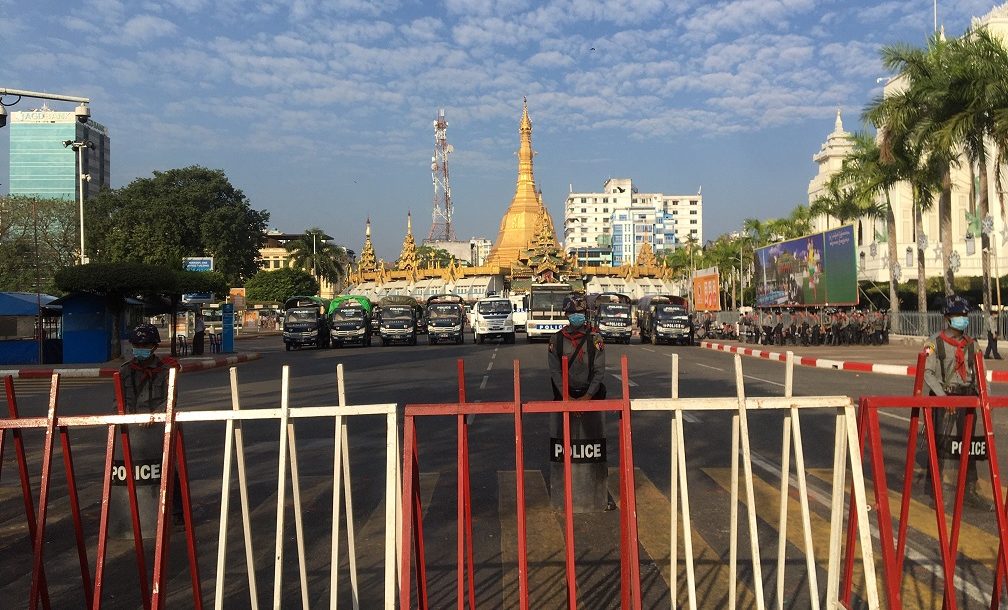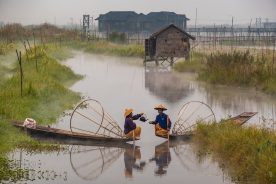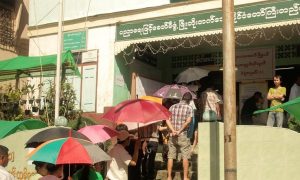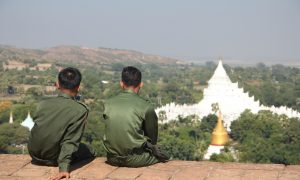On Monday, 1 February, in the early hours before Myanmar’s Parliament was set to convene, the military (Tatmadaw) overthrew the country’s elected government and detained more than 100 prominent lawmakers and activists. The move seems to put an end to the country’s inchoate democratic transition, which first began in 2010 when the Tatmadaw allowed multiparty elections, paving the way to a semi-civilian parliamentary democracy in 2011.
What events precipitated the military coup? Why did the military intervene in electoral politics now, only ten years after the country’s partial democratic transition? And what comes next?
In the last week of January the military had rung alarm bells by repeatedly raising complaints of electoral fraud and erroneous voter lists that its close affiliate the Union Solidarity and Development Party (USDP) had initiated in the wake of national elections in November 2020. Most observers were surprised given the military had previously affirmed the “successful holding” of the general election and at first refrained from endorsing the USDP’s claims of election fraud. Military spokesperson Zaw Min Tun refused to rule out the possibility of a coup in a press briefing on 26 January. Commander-in-Chief Min Aung Hlaing ominously stated that if the law was not followed, the military might have to “discard” or “tear up the constitution.” However the military quickly alleviated fears of a coup days later when the Tatmadaw issued a statement insisting that the media had mischaracterised Min Aung Hlaing’s statement and that the military pledged to “abide by the Constitution.”
In retrospect, the specific wording of the statement should have been seen as a red flag: “the Tatmadaw will perform its tasks within the frame of enacted law while safeguarding the Constitution.” The Tatmadaw views itself as the defender of national unity and sovereignty and is committed to its particular form of “disciplined democracy.” As such, the military claims to be acting in defense of the 2008 Constitution and attempts to justify its actions as a legitimate recourse to uphold the rule of law.
Soon after taking power, the military issued another statement announcing that Vice President Myint Swe, now serving as Interim President, had declared a state of emergency and transferred all power to Commander-in-Chief Min Aung Hlaing. The military furthermore stated that it would serve for one year, citing sections 417 and 418 of the 2008 military-drafted constitution, and multiple complaints of election fraud, as pretext for its seizing power. Section 417 grants the president the power to declare a state of emergency “after co-ordinating with the National Defence and Security Council” in the event of a crisis “that may cause the loss of sovereignty,” while Section 418(a) specifies that the President shall transfer all “legislative, executive and judicial powers” to the Commander-in-Chief “to carry out necessary measures to speedily restore its original situation in the Union.”
The military has since announced a new cabinet featuring many familiar faces from the previous USDP government. Two days after the coup, the Tatmadaw filed charges against State Counsellor Aung San Suu Kyi for violating the Import and Export Law after allegedly finding six unregistered walkie-talkies searching her house. President Win Myint, who also represents Suu Kyi’s National League for Democracy (NLD), is facing similar charges for breach of COVID-19 pandemic restrictions by greeting NLD supporters during the pre-election campaign period.
The series of coordinated steps, the widespread presence of security forces in Naypyidaw and Yangon on the day of the coup, and the constitutional justifications put forward to justify the military takeover, all suggest that this move was premeditated. Yet Myanmar analysts are left wondering why the army decided to take power now.
Let us consider several possible explanations. First, it is worthwhile—for the sake of argument—to take the military’s claims that they are defending the Constitution at face value. It seems clear from many conversations with sources in Myanmar and based on cursory analysis of Tatmadaw statements throughout January that the military genuinely believes its own propaganda and thus committed itself to a path with no offramp except constitutional crisis. The consistency of the military’s rhetoric supports this explanation. In a statement harking back to the language of the former military junta, the State Peace and Development Council (SPDC), Commander-in-Chief Min Aung Hlaing vowed “to practice the genuine, discipline-flourishing multiparty democratic system in a fair manner.” If the armed forces truly believe that the NLD had impeded the legitimate functioning of constitutional democracy by refusing to hear complaints of electoral fraud (the Union Election Commission had dismissed its complaints, while the Supreme Court was set to deliberate a case prior to the military coup), perhaps it felt it had no choice but to block Parliament from convening.
Yet several factors indicate the shortfalls of relying on this explanation alone. For starters, if the military simply wanted to ensure that its claims of electoral fraud were heard and that the Supreme Court was able to issue a decision before an NLD-led Parliament could convene, then why did it need to declare emergency rule for a whole year? Secondly, if the military’s appeals to the legitimacy of its coup rest on Sections 417 and 418 of the 2008 Constitution, why did it file relatively minor criminal charges against Aung San Suu Kyi and President Win Myint? If the real threat was to the integrity of the Union, why would it not pursue more serious charges of sedition against Suu Kyi and the NLD? As Myanmar constitutional scholar Melissa Crouch has pointed out, “Even if the military had evidence of voter fraud, it is not self-evident that election fraud constitutes an emergency. The Constitution is clear that an emergency is an extraordinary situation that poses a grave threat to the country.”
Significantly, by detaining President Win Myint in the process, the military also bypassed the constitutionally mandated decision-making process to declare a state of emergency, which power falls to the President alone. However, as Win Myint was detained, it’s not clear how he could have convened the National Defence and Security Council (NDSC) and declared a state of emergency. Thus, the military’s claims of defending the constitution break down under closer scrutiny.
A second possible motivation for the coup is tied to the underlying power struggle between the military and civilian government. Many observers note that the Tatmadaw sees Suu Kyi as a threat to its interests. Her party is committed to amending the undemocratic 2008 Constitution, which the military drafted without input from other parties or civil society under the previous junta. Its failed attempt rankled the Tatmadaw in early 2020. Aung San Suu Kyi has also refused to convene the powerful National Defence and Security Council dominated by military commanders. Reflecting the deep state of distrust between the State Counsellor and Commander-in-Chief, the two reportedly had not met for more than a year. Perhaps a collision was inevitable.
Yet this theory seems overly simplistic for several reasons. First and perhaps most obviously, Suu Kyi’s efforts to reform the 2008 Constitution met with failure after the military quarter in Parliament blocked a vote of support. So the NLD’s threat to the military’s constitution was mostly symbolic. Moreover, the Tatmadaw had little incentive to interfere in politics since its interests were protected by the fact that it wrote the constitution to guarantee its continued power and control over several important government ministries. Further undermining this line of reasoning is the fact that Suu Kyi has been careful not to criticise the military. In fact, she went to enormous lengths to try and earn its trust, repeatedly praising the Tatmadaw, which her father General Aung San founded. Most notably in 2019 she appeared at the International Court of Justice to defend the military against accusations of genocide against the Rohingya Muslim minority.
Barring the first two possible explanations—that the Tatmadaw was genuinely acting in defence of the 2008 Constitution, or that the underlying struggle for power between the NLD and armed forces led to a breakdown—a third motivation may have been Min Aung Hlaing’s personal ambitions. Supporting this third explanation are several related factors. Min Aung Hlaing was set to retire from the position of Commander-in-Chief in July, after the retirement age was officially extended to 65 in 2016. There were also rumours that Min Aung Hlaing had held presidential ambitions of his own. But which party would he join? The USDP had lost credibility and performed abysmally in both 2015 and 2020, and newly created parties in 2020 fared equally poorly. The senior general likely refrained from stepping down to participate in electoral politics as he saw no discernible path to the presidency.
မြန်မာနိုင်ငံရှိ တင်းမာသောအမြင်သဘောထားနှင့် ဒီမိုကရေစီလှည့်စားမှုများ - ဖွဲ့စည်းပုံအခြေခံဥပဒေပြင်ဆင်ခြင်းအား နိုင်ငံရေးစွမ်းဆောင်မှုအဖြစ် အသုံးချခြင်း
Illiberalism and democratic illusions in Myanmar
Second, as stated above, the fact that Aung San Suu Kyi had refused to convene the National Defence and Security Council almost certainly grated on the Commander-in-Chief. More specifically, the NDSC was expected to appoint Min Aung Hlaing’s successor following his retirement, a decision made in conjunction with Aung San Suu Kyi, who is a member of the NDSC in her position as Foreign Minister. It is plausible that Suu Kyi wanted to wait out Min Aung Hlaing’s retirement before proposing a more reform-minded general to succeed him. These concerns likely loomed large in the senior general’s calculations leading up to the military putsch.
Yet even if the decision to launch the coup ultimately fell to Min Aung Hlaing alone, he needed to persuade a significant coterie of underlings to support it. The Tatmadaw works as an enormous institution. While commands may be directed top-down, they require broad buy-in to enforce. Rather than owing to the senior general’s boundless appetite for power alone, the coup was more likely the result of a combination of the above factors: the military sincerely believed that election fraud occurred; it felt backed into a corner as tensions with the elected leadership came to a head; and Min Aung Hlaing, hungry for personal aggrandisement and bitterly opposed to Aung San Suu Kyi’s dominant position, sensed an opportunity.
Despite the seeming incredulity of the military and USDP’s claims of fraud, there is reason to take the Tatmadaw’s insistence on the legitimacy of such claims seriously. That is not to say that fraud occurred—numerous election observers and the Union Election Commission found no evidence to support these allegations. But what matters is that the military believes it occurred and acted with complete conviction that the NLD had rigged the election. After all, it has been repeating such claims for the past month ad nauseum—though foreign analysts, not wanting to hear it or not wanting to acknowledge the military’s grievances, treated the claims as absurd and roundly dismissed them.
When it doubled down on its dispute of the election results, the Tatmadaw backed itself into a corner from which there was no way out. Thus the standoff between the military and civilian camps reached a boiling point when negotiations broke down in the days immediately preceding the coup. Finally, sensing a shrinking window of opportunity to block the NLD from forming a new government despite the military’s objections, Min Aung Hlaing, nearing retirement and running out of options, decided the time to act was now.
What comes next largely comes down to the Commander-in-Chief’s calculus and perception of regime stability, the Tatmadaw’s response to domestic protests (which are mounting), and potential for defections, which cannot be ruled out entirely.
Whether the current crisis leads to a peaceful resolution or crackdown also depends on what the regime decides to do with Aung San Suu Kyi. If they block her from participating in politics the people will almost certainly revolt. If instead they choose to negotiate with her and NLD leaders (which seems less likely), it is possible Myanmar’s democracy will re-emerge, though significantly hobbled by any power-sharing agreement struck with the military. The military may be intent to follow through on its pledge to hold elections, but they will be neither free nor fair, ensuring the continuation of “soft” military rule in one form or another perhaps akin to Thailand.
The military almost certainly recognises that it cannot turn back to the clock to a dictatorship identical to that before 2011. If it is to peaceably withstand the enormous pressures building from popular resentment against the coup, it will have to make significant concessions to the people. One avenue that Min Aung Hlaing has likely considered is a Thai-style constitution which cements the military’s dominant presence in the legislature (perhaps over and above the previous 25 percent guaranteed by the 2008 Constitution) as well as more control over the appointed Union Election Commission, the leadership of which the NLD nominated after winning the 2015 election. However, this will not assuage the demands of angry protesters, who have called on the military to relinquish power entirely.
It is conceivable that popular protests, which this week expanded to tens and likely hundreds of thousands, could force the new regime to step aside and release NLD leaders sooner than anticipated. The Tatmadaw and Min Aung Hlaing, however, do not have a history of backing down in the face of resistance. Further bloodshed and repression therefore remain probable. The international community will be watching closely for opportunities to persuade the generals to exercise restraint in the hopes of finding a political solution.
 Facebook
Facebook  Twitter
Twitter  Soundcloud
Soundcloud  Youtube
Youtube  Rss
Rss 



